NRS222 Case Study: Analyzing Mr. Walter Reed's Mental Health and Care
VerifiedAdded on 2022/12/19
|10
|3268
|73
Case Study
AI Summary
This case study analysis examines the mental health of Mr. Walter Reed, a 69-year-old man with a history of bipolar disorder, diabetes, and hypertension, who presented to the emergency department in a confused state. The analysis identifies his condition as Bipolar I disorder, most recent episode depressed, and explores both pharmacological and non-pharmacological care options. Pharmacological interventions include lithium carbonate and potentially antidepressants, while non-pharmacological approaches emphasize psychosocial interventions, including family therapy, to address his depressive symptoms, suicide ideation, and challenges in medication compliance. The paper also delves into the lived experience of mental illness, ethical considerations such as patient autonomy and beneficence, legal frameworks, and necessary consultations/referrals, including mental health counselors and nutritionists, to provide comprehensive care. The importance of culturally safe interventions and patient-centered care is highlighted throughout, emphasizing the need to address both disease-related and social-emotional challenges for complete recovery.
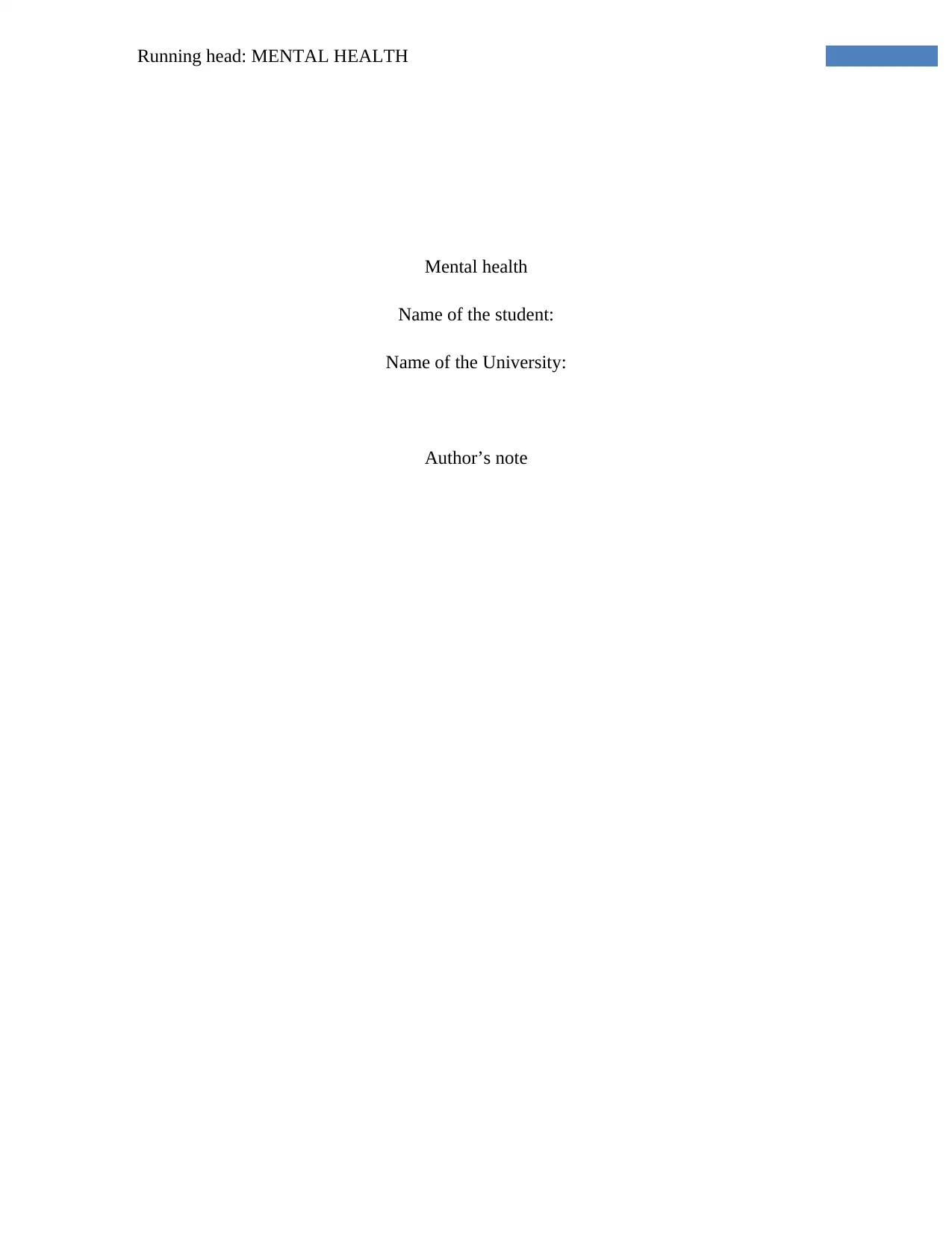
Running head: MENTAL HEALTH
Mental health
Name of the student:
Name of the University:
Author’s note
Mental health
Name of the student:
Name of the University:
Author’s note
Paraphrase This Document
Need a fresh take? Get an instant paraphrase of this document with our AI Paraphraser
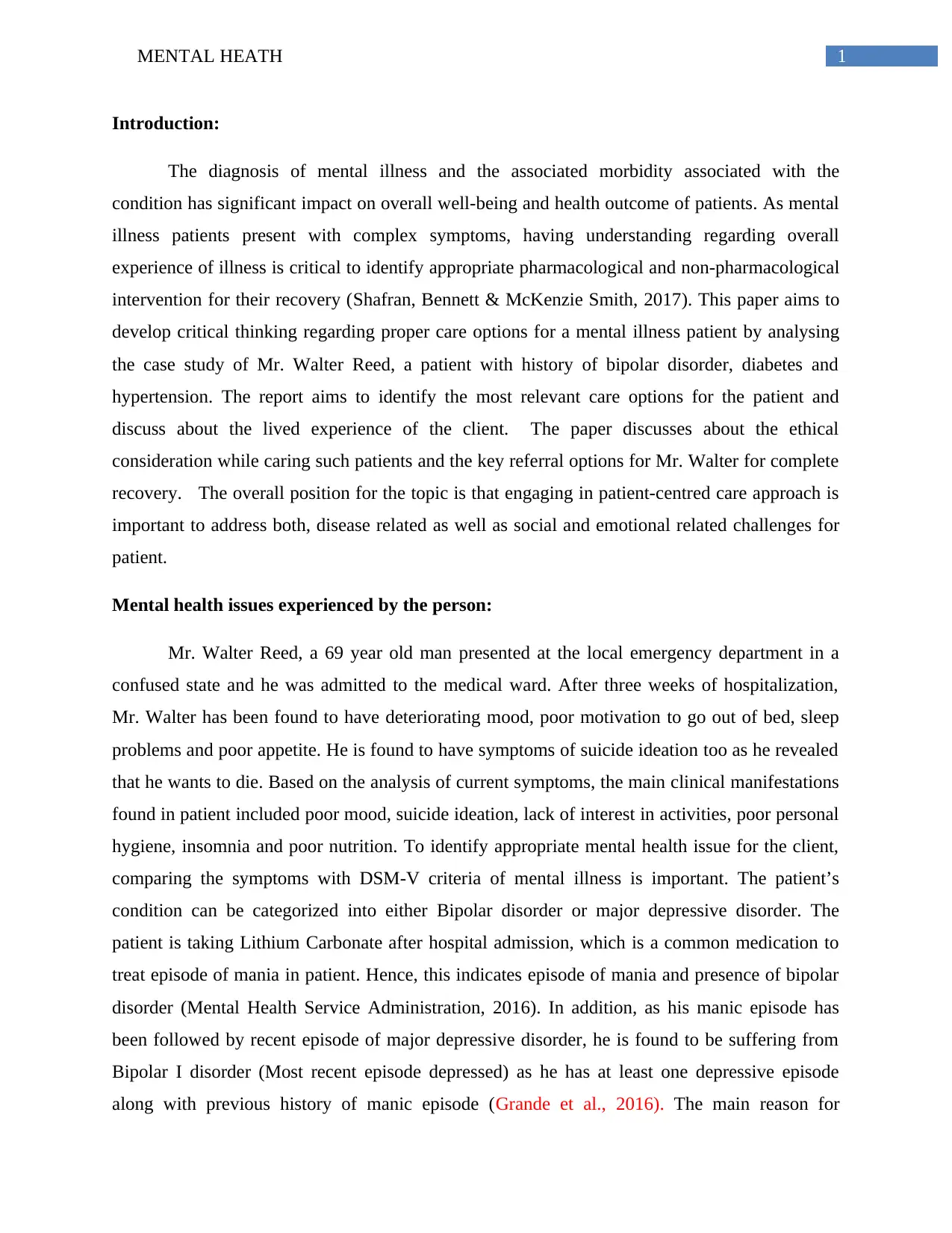
1MENTAL HEATH
Introduction:
The diagnosis of mental illness and the associated morbidity associated with the
condition has significant impact on overall well-being and health outcome of patients. As mental
illness patients present with complex symptoms, having understanding regarding overall
experience of illness is critical to identify appropriate pharmacological and non-pharmacological
intervention for their recovery (Shafran, Bennett & McKenzie Smith, 2017). This paper aims to
develop critical thinking regarding proper care options for a mental illness patient by analysing
the case study of Mr. Walter Reed, a patient with history of bipolar disorder, diabetes and
hypertension. The report aims to identify the most relevant care options for the patient and
discuss about the lived experience of the client. The paper discusses about the ethical
consideration while caring such patients and the key referral options for Mr. Walter for complete
recovery. The overall position for the topic is that engaging in patient-centred care approach is
important to address both, disease related as well as social and emotional related challenges for
patient.
Mental health issues experienced by the person:
Mr. Walter Reed, a 69 year old man presented at the local emergency department in a
confused state and he was admitted to the medical ward. After three weeks of hospitalization,
Mr. Walter has been found to have deteriorating mood, poor motivation to go out of bed, sleep
problems and poor appetite. He is found to have symptoms of suicide ideation too as he revealed
that he wants to die. Based on the analysis of current symptoms, the main clinical manifestations
found in patient included poor mood, suicide ideation, lack of interest in activities, poor personal
hygiene, insomnia and poor nutrition. To identify appropriate mental health issue for the client,
comparing the symptoms with DSM-V criteria of mental illness is important. The patient’s
condition can be categorized into either Bipolar disorder or major depressive disorder. The
patient is taking Lithium Carbonate after hospital admission, which is a common medication to
treat episode of mania in patient. Hence, this indicates episode of mania and presence of bipolar
disorder (Mental Health Service Administration, 2016). In addition, as his manic episode has
been followed by recent episode of major depressive disorder, he is found to be suffering from
Bipolar I disorder (Most recent episode depressed) as he has at least one depressive episode
along with previous history of manic episode (Grande et al., 2016). The main reason for
Introduction:
The diagnosis of mental illness and the associated morbidity associated with the
condition has significant impact on overall well-being and health outcome of patients. As mental
illness patients present with complex symptoms, having understanding regarding overall
experience of illness is critical to identify appropriate pharmacological and non-pharmacological
intervention for their recovery (Shafran, Bennett & McKenzie Smith, 2017). This paper aims to
develop critical thinking regarding proper care options for a mental illness patient by analysing
the case study of Mr. Walter Reed, a patient with history of bipolar disorder, diabetes and
hypertension. The report aims to identify the most relevant care options for the patient and
discuss about the lived experience of the client. The paper discusses about the ethical
consideration while caring such patients and the key referral options for Mr. Walter for complete
recovery. The overall position for the topic is that engaging in patient-centred care approach is
important to address both, disease related as well as social and emotional related challenges for
patient.
Mental health issues experienced by the person:
Mr. Walter Reed, a 69 year old man presented at the local emergency department in a
confused state and he was admitted to the medical ward. After three weeks of hospitalization,
Mr. Walter has been found to have deteriorating mood, poor motivation to go out of bed, sleep
problems and poor appetite. He is found to have symptoms of suicide ideation too as he revealed
that he wants to die. Based on the analysis of current symptoms, the main clinical manifestations
found in patient included poor mood, suicide ideation, lack of interest in activities, poor personal
hygiene, insomnia and poor nutrition. To identify appropriate mental health issue for the client,
comparing the symptoms with DSM-V criteria of mental illness is important. The patient’s
condition can be categorized into either Bipolar disorder or major depressive disorder. The
patient is taking Lithium Carbonate after hospital admission, which is a common medication to
treat episode of mania in patient. Hence, this indicates episode of mania and presence of bipolar
disorder (Mental Health Service Administration, 2016). In addition, as his manic episode has
been followed by recent episode of major depressive disorder, he is found to be suffering from
Bipolar I disorder (Most recent episode depressed) as he has at least one depressive episode
along with previous history of manic episode (Grande et al., 2016). The main reason for
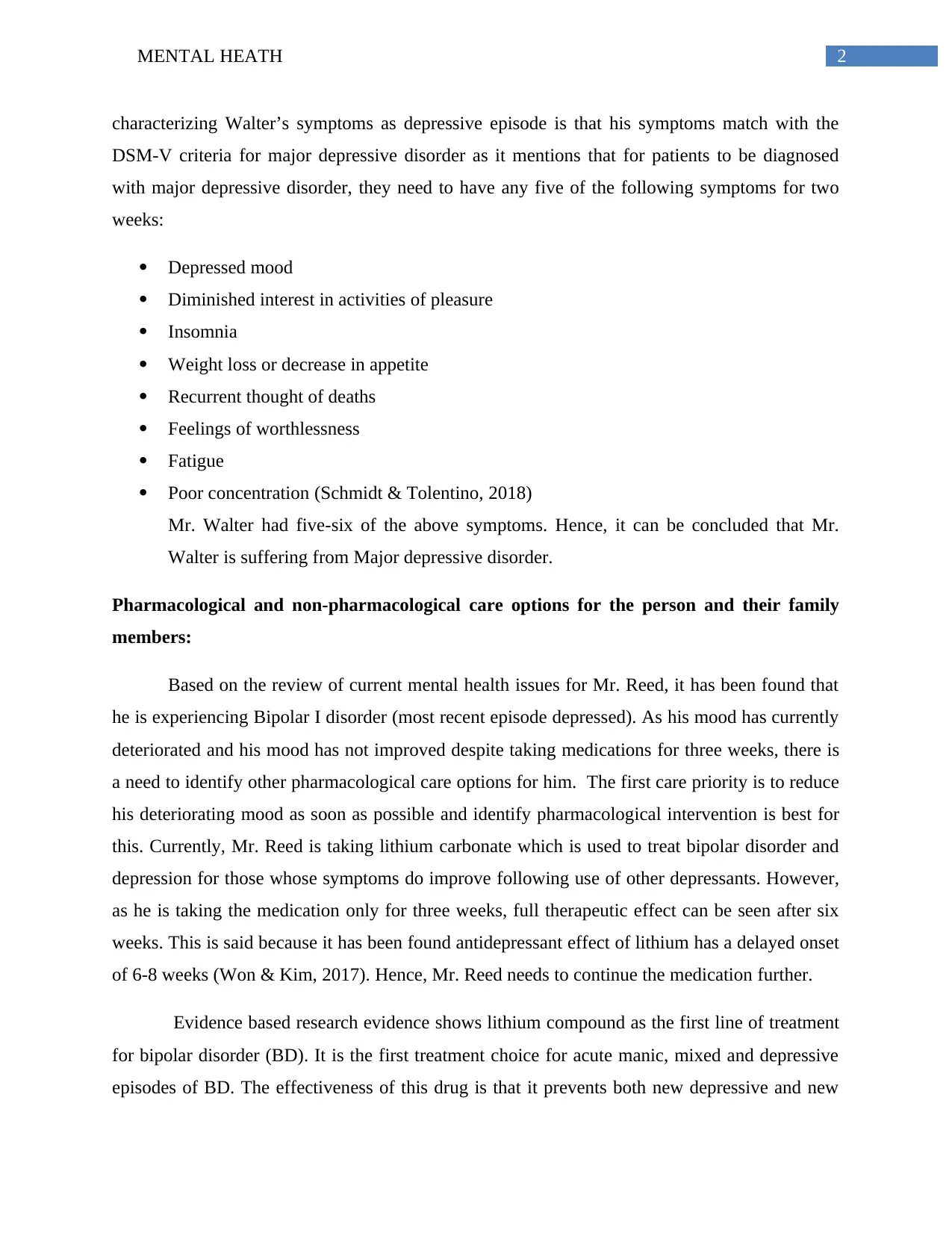
2MENTAL HEATH
characterizing Walter’s symptoms as depressive episode is that his symptoms match with the
DSM-V criteria for major depressive disorder as it mentions that for patients to be diagnosed
with major depressive disorder, they need to have any five of the following symptoms for two
weeks:
Depressed mood
Diminished interest in activities of pleasure
Insomnia
Weight loss or decrease in appetite
Recurrent thought of deaths
Feelings of worthlessness
Fatigue
Poor concentration (Schmidt & Tolentino, 2018)
Mr. Walter had five-six of the above symptoms. Hence, it can be concluded that Mr.
Walter is suffering from Major depressive disorder.
Pharmacological and non-pharmacological care options for the person and their family
members:
Based on the review of current mental health issues for Mr. Reed, it has been found that
he is experiencing Bipolar I disorder (most recent episode depressed). As his mood has currently
deteriorated and his mood has not improved despite taking medications for three weeks, there is
a need to identify other pharmacological care options for him. The first care priority is to reduce
his deteriorating mood as soon as possible and identify pharmacological intervention is best for
this. Currently, Mr. Reed is taking lithium carbonate which is used to treat bipolar disorder and
depression for those whose symptoms do improve following use of other depressants. However,
as he is taking the medication only for three weeks, full therapeutic effect can be seen after six
weeks. This is said because it has been found antidepressant effect of lithium has a delayed onset
of 6-8 weeks (Won & Kim, 2017). Hence, Mr. Reed needs to continue the medication further.
Evidence based research evidence shows lithium compound as the first line of treatment
for bipolar disorder (BD). It is the first treatment choice for acute manic, mixed and depressive
episodes of BD. The effectiveness of this drug is that it prevents both new depressive and new
characterizing Walter’s symptoms as depressive episode is that his symptoms match with the
DSM-V criteria for major depressive disorder as it mentions that for patients to be diagnosed
with major depressive disorder, they need to have any five of the following symptoms for two
weeks:
Depressed mood
Diminished interest in activities of pleasure
Insomnia
Weight loss or decrease in appetite
Recurrent thought of deaths
Feelings of worthlessness
Fatigue
Poor concentration (Schmidt & Tolentino, 2018)
Mr. Walter had five-six of the above symptoms. Hence, it can be concluded that Mr.
Walter is suffering from Major depressive disorder.
Pharmacological and non-pharmacological care options for the person and their family
members:
Based on the review of current mental health issues for Mr. Reed, it has been found that
he is experiencing Bipolar I disorder (most recent episode depressed). As his mood has currently
deteriorated and his mood has not improved despite taking medications for three weeks, there is
a need to identify other pharmacological care options for him. The first care priority is to reduce
his deteriorating mood as soon as possible and identify pharmacological intervention is best for
this. Currently, Mr. Reed is taking lithium carbonate which is used to treat bipolar disorder and
depression for those whose symptoms do improve following use of other depressants. However,
as he is taking the medication only for three weeks, full therapeutic effect can be seen after six
weeks. This is said because it has been found antidepressant effect of lithium has a delayed onset
of 6-8 weeks (Won & Kim, 2017). Hence, Mr. Reed needs to continue the medication further.
Evidence based research evidence shows lithium compound as the first line of treatment
for bipolar disorder (BD). It is the first treatment choice for acute manic, mixed and depressive
episodes of BD. The effectiveness of this drug is that it prevents both new depressive and new
⊘ This is a preview!⊘
Do you want full access?
Subscribe today to unlock all pages.

Trusted by 1+ million students worldwide
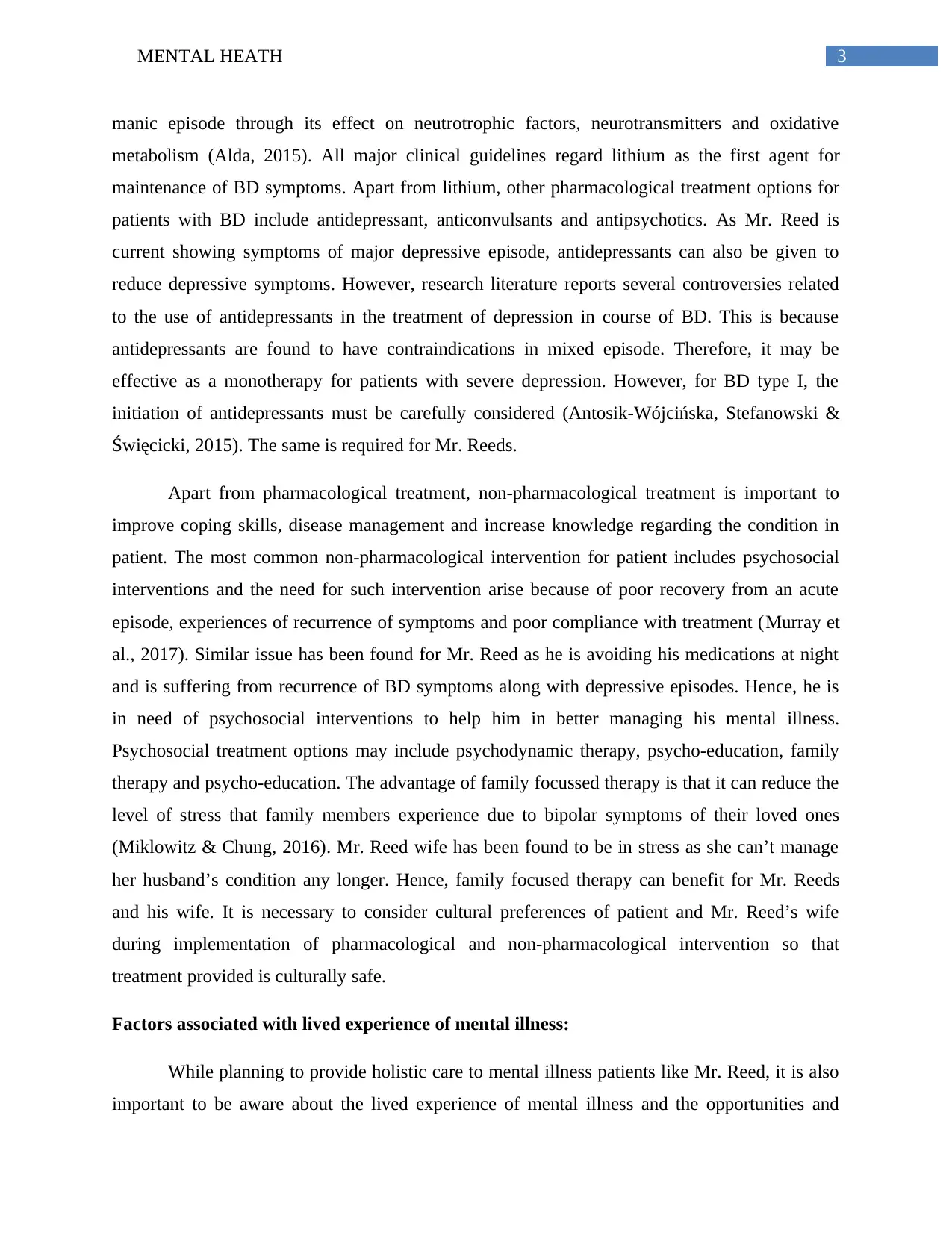
3MENTAL HEATH
manic episode through its effect on neutrotrophic factors, neurotransmitters and oxidative
metabolism (Alda, 2015). All major clinical guidelines regard lithium as the first agent for
maintenance of BD symptoms. Apart from lithium, other pharmacological treatment options for
patients with BD include antidepressant, anticonvulsants and antipsychotics. As Mr. Reed is
current showing symptoms of major depressive episode, antidepressants can also be given to
reduce depressive symptoms. However, research literature reports several controversies related
to the use of antidepressants in the treatment of depression in course of BD. This is because
antidepressants are found to have contraindications in mixed episode. Therefore, it may be
effective as a monotherapy for patients with severe depression. However, for BD type I, the
initiation of antidepressants must be carefully considered (Antosik-Wójcińska, Stefanowski &
Święcicki, 2015). The same is required for Mr. Reeds.
Apart from pharmacological treatment, non-pharmacological treatment is important to
improve coping skills, disease management and increase knowledge regarding the condition in
patient. The most common non-pharmacological intervention for patient includes psychosocial
interventions and the need for such intervention arise because of poor recovery from an acute
episode, experiences of recurrence of symptoms and poor compliance with treatment (Murray et
al., 2017). Similar issue has been found for Mr. Reed as he is avoiding his medications at night
and is suffering from recurrence of BD symptoms along with depressive episodes. Hence, he is
in need of psychosocial interventions to help him in better managing his mental illness.
Psychosocial treatment options may include psychodynamic therapy, psycho-education, family
therapy and psycho-education. The advantage of family focussed therapy is that it can reduce the
level of stress that family members experience due to bipolar symptoms of their loved ones
(Miklowitz & Chung, 2016). Mr. Reed wife has been found to be in stress as she can’t manage
her husband’s condition any longer. Hence, family focused therapy can benefit for Mr. Reeds
and his wife. It is necessary to consider cultural preferences of patient and Mr. Reed’s wife
during implementation of pharmacological and non-pharmacological intervention so that
treatment provided is culturally safe.
Factors associated with lived experience of mental illness:
While planning to provide holistic care to mental illness patients like Mr. Reed, it is also
important to be aware about the lived experience of mental illness and the opportunities and
manic episode through its effect on neutrotrophic factors, neurotransmitters and oxidative
metabolism (Alda, 2015). All major clinical guidelines regard lithium as the first agent for
maintenance of BD symptoms. Apart from lithium, other pharmacological treatment options for
patients with BD include antidepressant, anticonvulsants and antipsychotics. As Mr. Reed is
current showing symptoms of major depressive episode, antidepressants can also be given to
reduce depressive symptoms. However, research literature reports several controversies related
to the use of antidepressants in the treatment of depression in course of BD. This is because
antidepressants are found to have contraindications in mixed episode. Therefore, it may be
effective as a monotherapy for patients with severe depression. However, for BD type I, the
initiation of antidepressants must be carefully considered (Antosik-Wójcińska, Stefanowski &
Święcicki, 2015). The same is required for Mr. Reeds.
Apart from pharmacological treatment, non-pharmacological treatment is important to
improve coping skills, disease management and increase knowledge regarding the condition in
patient. The most common non-pharmacological intervention for patient includes psychosocial
interventions and the need for such intervention arise because of poor recovery from an acute
episode, experiences of recurrence of symptoms and poor compliance with treatment (Murray et
al., 2017). Similar issue has been found for Mr. Reed as he is avoiding his medications at night
and is suffering from recurrence of BD symptoms along with depressive episodes. Hence, he is
in need of psychosocial interventions to help him in better managing his mental illness.
Psychosocial treatment options may include psychodynamic therapy, psycho-education, family
therapy and psycho-education. The advantage of family focussed therapy is that it can reduce the
level of stress that family members experience due to bipolar symptoms of their loved ones
(Miklowitz & Chung, 2016). Mr. Reed wife has been found to be in stress as she can’t manage
her husband’s condition any longer. Hence, family focused therapy can benefit for Mr. Reeds
and his wife. It is necessary to consider cultural preferences of patient and Mr. Reed’s wife
during implementation of pharmacological and non-pharmacological intervention so that
treatment provided is culturally safe.
Factors associated with lived experience of mental illness:
While planning to provide holistic care to mental illness patients like Mr. Reed, it is also
important to be aware about the lived experience of mental illness and the opportunities and
Paraphrase This Document
Need a fresh take? Get an instant paraphrase of this document with our AI Paraphraser
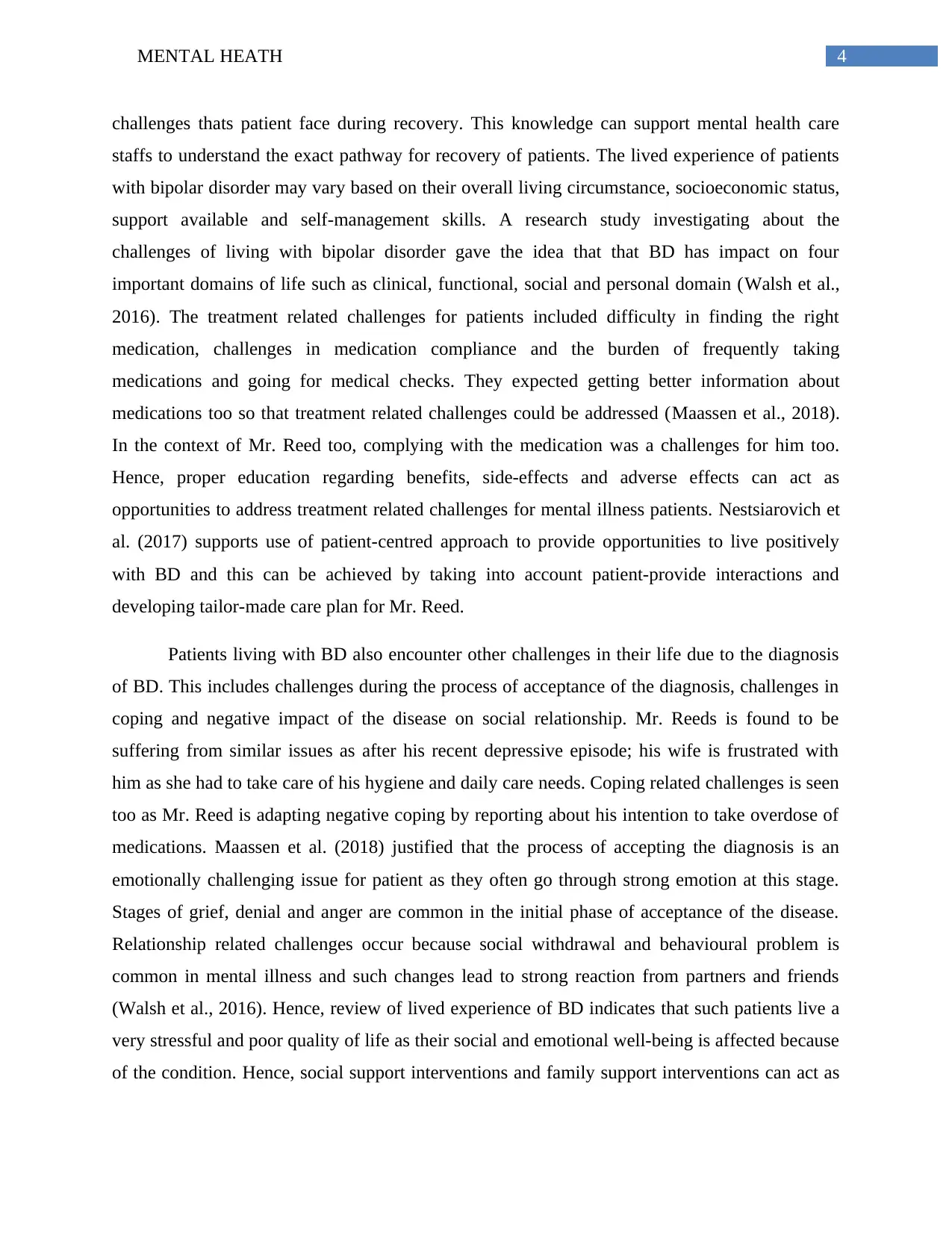
4MENTAL HEATH
challenges thats patient face during recovery. This knowledge can support mental health care
staffs to understand the exact pathway for recovery of patients. The lived experience of patients
with bipolar disorder may vary based on their overall living circumstance, socioeconomic status,
support available and self-management skills. A research study investigating about the
challenges of living with bipolar disorder gave the idea that that BD has impact on four
important domains of life such as clinical, functional, social and personal domain (Walsh et al.,
2016). The treatment related challenges for patients included difficulty in finding the right
medication, challenges in medication compliance and the burden of frequently taking
medications and going for medical checks. They expected getting better information about
medications too so that treatment related challenges could be addressed (Maassen et al., 2018).
In the context of Mr. Reed too, complying with the medication was a challenges for him too.
Hence, proper education regarding benefits, side-effects and adverse effects can act as
opportunities to address treatment related challenges for mental illness patients. Nestsiarovich et
al. (2017) supports use of patient-centred approach to provide opportunities to live positively
with BD and this can be achieved by taking into account patient-provide interactions and
developing tailor-made care plan for Mr. Reed.
Patients living with BD also encounter other challenges in their life due to the diagnosis
of BD. This includes challenges during the process of acceptance of the diagnosis, challenges in
coping and negative impact of the disease on social relationship. Mr. Reeds is found to be
suffering from similar issues as after his recent depressive episode; his wife is frustrated with
him as she had to take care of his hygiene and daily care needs. Coping related challenges is seen
too as Mr. Reed is adapting negative coping by reporting about his intention to take overdose of
medications. Maassen et al. (2018) justified that the process of accepting the diagnosis is an
emotionally challenging issue for patient as they often go through strong emotion at this stage.
Stages of grief, denial and anger are common in the initial phase of acceptance of the disease.
Relationship related challenges occur because social withdrawal and behavioural problem is
common in mental illness and such changes lead to strong reaction from partners and friends
(Walsh et al., 2016). Hence, review of lived experience of BD indicates that such patients live a
very stressful and poor quality of life as their social and emotional well-being is affected because
of the condition. Hence, social support interventions and family support interventions can act as
challenges thats patient face during recovery. This knowledge can support mental health care
staffs to understand the exact pathway for recovery of patients. The lived experience of patients
with bipolar disorder may vary based on their overall living circumstance, socioeconomic status,
support available and self-management skills. A research study investigating about the
challenges of living with bipolar disorder gave the idea that that BD has impact on four
important domains of life such as clinical, functional, social and personal domain (Walsh et al.,
2016). The treatment related challenges for patients included difficulty in finding the right
medication, challenges in medication compliance and the burden of frequently taking
medications and going for medical checks. They expected getting better information about
medications too so that treatment related challenges could be addressed (Maassen et al., 2018).
In the context of Mr. Reed too, complying with the medication was a challenges for him too.
Hence, proper education regarding benefits, side-effects and adverse effects can act as
opportunities to address treatment related challenges for mental illness patients. Nestsiarovich et
al. (2017) supports use of patient-centred approach to provide opportunities to live positively
with BD and this can be achieved by taking into account patient-provide interactions and
developing tailor-made care plan for Mr. Reed.
Patients living with BD also encounter other challenges in their life due to the diagnosis
of BD. This includes challenges during the process of acceptance of the diagnosis, challenges in
coping and negative impact of the disease on social relationship. Mr. Reeds is found to be
suffering from similar issues as after his recent depressive episode; his wife is frustrated with
him as she had to take care of his hygiene and daily care needs. Coping related challenges is seen
too as Mr. Reed is adapting negative coping by reporting about his intention to take overdose of
medications. Maassen et al. (2018) justified that the process of accepting the diagnosis is an
emotionally challenging issue for patient as they often go through strong emotion at this stage.
Stages of grief, denial and anger are common in the initial phase of acceptance of the disease.
Relationship related challenges occur because social withdrawal and behavioural problem is
common in mental illness and such changes lead to strong reaction from partners and friends
(Walsh et al., 2016). Hence, review of lived experience of BD indicates that such patients live a
very stressful and poor quality of life as their social and emotional well-being is affected because
of the condition. Hence, social support interventions and family support interventions can act as
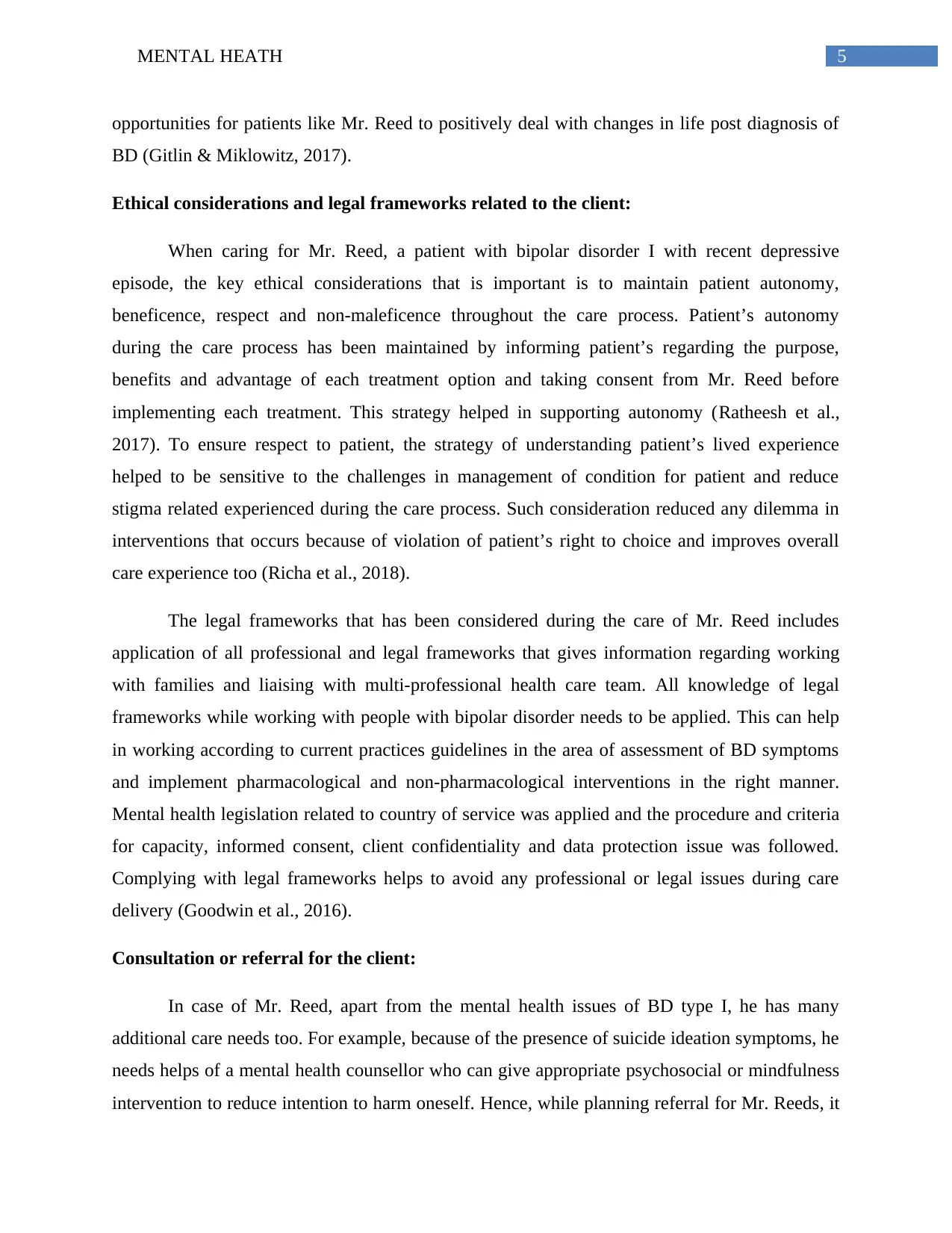
5MENTAL HEATH
opportunities for patients like Mr. Reed to positively deal with changes in life post diagnosis of
BD (Gitlin & Miklowitz, 2017).
Ethical considerations and legal frameworks related to the client:
When caring for Mr. Reed, a patient with bipolar disorder I with recent depressive
episode, the key ethical considerations that is important is to maintain patient autonomy,
beneficence, respect and non-maleficence throughout the care process. Patient’s autonomy
during the care process has been maintained by informing patient’s regarding the purpose,
benefits and advantage of each treatment option and taking consent from Mr. Reed before
implementing each treatment. This strategy helped in supporting autonomy (Ratheesh et al.,
2017). To ensure respect to patient, the strategy of understanding patient’s lived experience
helped to be sensitive to the challenges in management of condition for patient and reduce
stigma related experienced during the care process. Such consideration reduced any dilemma in
interventions that occurs because of violation of patient’s right to choice and improves overall
care experience too (Richa et al., 2018).
The legal frameworks that has been considered during the care of Mr. Reed includes
application of all professional and legal frameworks that gives information regarding working
with families and liaising with multi-professional health care team. All knowledge of legal
frameworks while working with people with bipolar disorder needs to be applied. This can help
in working according to current practices guidelines in the area of assessment of BD symptoms
and implement pharmacological and non-pharmacological interventions in the right manner.
Mental health legislation related to country of service was applied and the procedure and criteria
for capacity, informed consent, client confidentiality and data protection issue was followed.
Complying with legal frameworks helps to avoid any professional or legal issues during care
delivery (Goodwin et al., 2016).
Consultation or referral for the client:
In case of Mr. Reed, apart from the mental health issues of BD type I, he has many
additional care needs too. For example, because of the presence of suicide ideation symptoms, he
needs helps of a mental health counsellor who can give appropriate psychosocial or mindfulness
intervention to reduce intention to harm oneself. Hence, while planning referral for Mr. Reeds, it
opportunities for patients like Mr. Reed to positively deal with changes in life post diagnosis of
BD (Gitlin & Miklowitz, 2017).
Ethical considerations and legal frameworks related to the client:
When caring for Mr. Reed, a patient with bipolar disorder I with recent depressive
episode, the key ethical considerations that is important is to maintain patient autonomy,
beneficence, respect and non-maleficence throughout the care process. Patient’s autonomy
during the care process has been maintained by informing patient’s regarding the purpose,
benefits and advantage of each treatment option and taking consent from Mr. Reed before
implementing each treatment. This strategy helped in supporting autonomy (Ratheesh et al.,
2017). To ensure respect to patient, the strategy of understanding patient’s lived experience
helped to be sensitive to the challenges in management of condition for patient and reduce
stigma related experienced during the care process. Such consideration reduced any dilemma in
interventions that occurs because of violation of patient’s right to choice and improves overall
care experience too (Richa et al., 2018).
The legal frameworks that has been considered during the care of Mr. Reed includes
application of all professional and legal frameworks that gives information regarding working
with families and liaising with multi-professional health care team. All knowledge of legal
frameworks while working with people with bipolar disorder needs to be applied. This can help
in working according to current practices guidelines in the area of assessment of BD symptoms
and implement pharmacological and non-pharmacological interventions in the right manner.
Mental health legislation related to country of service was applied and the procedure and criteria
for capacity, informed consent, client confidentiality and data protection issue was followed.
Complying with legal frameworks helps to avoid any professional or legal issues during care
delivery (Goodwin et al., 2016).
Consultation or referral for the client:
In case of Mr. Reed, apart from the mental health issues of BD type I, he has many
additional care needs too. For example, because of the presence of suicide ideation symptoms, he
needs helps of a mental health counsellor who can give appropriate psychosocial or mindfulness
intervention to reduce intention to harm oneself. Hence, while planning referral for Mr. Reeds, it
⊘ This is a preview!⊘
Do you want full access?
Subscribe today to unlock all pages.

Trusted by 1+ million students worldwide
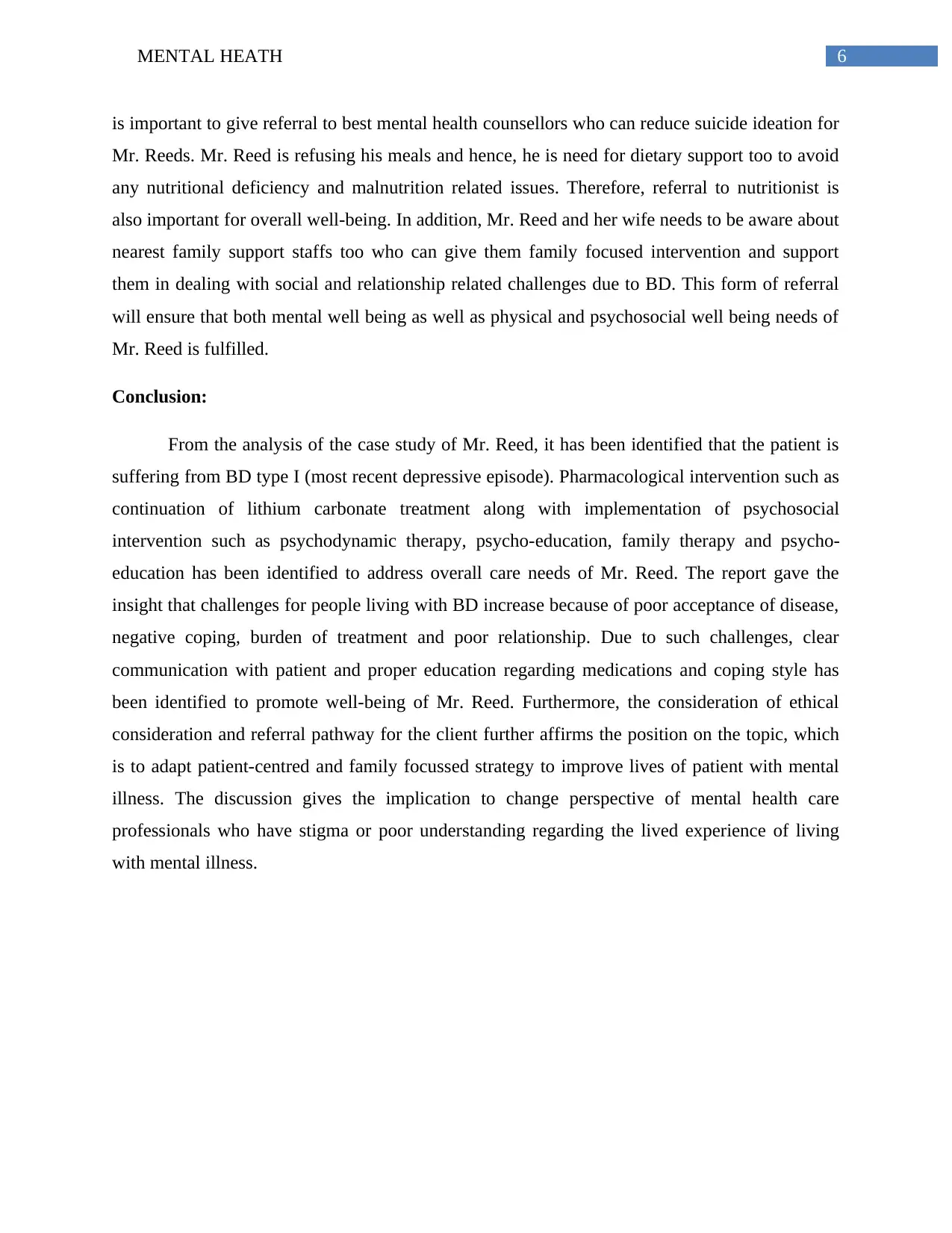
6MENTAL HEATH
is important to give referral to best mental health counsellors who can reduce suicide ideation for
Mr. Reeds. Mr. Reed is refusing his meals and hence, he is need for dietary support too to avoid
any nutritional deficiency and malnutrition related issues. Therefore, referral to nutritionist is
also important for overall well-being. In addition, Mr. Reed and her wife needs to be aware about
nearest family support staffs too who can give them family focused intervention and support
them in dealing with social and relationship related challenges due to BD. This form of referral
will ensure that both mental well being as well as physical and psychosocial well being needs of
Mr. Reed is fulfilled.
Conclusion:
From the analysis of the case study of Mr. Reed, it has been identified that the patient is
suffering from BD type I (most recent depressive episode). Pharmacological intervention such as
continuation of lithium carbonate treatment along with implementation of psychosocial
intervention such as psychodynamic therapy, psycho-education, family therapy and psycho-
education has been identified to address overall care needs of Mr. Reed. The report gave the
insight that challenges for people living with BD increase because of poor acceptance of disease,
negative coping, burden of treatment and poor relationship. Due to such challenges, clear
communication with patient and proper education regarding medications and coping style has
been identified to promote well-being of Mr. Reed. Furthermore, the consideration of ethical
consideration and referral pathway for the client further affirms the position on the topic, which
is to adapt patient-centred and family focussed strategy to improve lives of patient with mental
illness. The discussion gives the implication to change perspective of mental health care
professionals who have stigma or poor understanding regarding the lived experience of living
with mental illness.
is important to give referral to best mental health counsellors who can reduce suicide ideation for
Mr. Reeds. Mr. Reed is refusing his meals and hence, he is need for dietary support too to avoid
any nutritional deficiency and malnutrition related issues. Therefore, referral to nutritionist is
also important for overall well-being. In addition, Mr. Reed and her wife needs to be aware about
nearest family support staffs too who can give them family focused intervention and support
them in dealing with social and relationship related challenges due to BD. This form of referral
will ensure that both mental well being as well as physical and psychosocial well being needs of
Mr. Reed is fulfilled.
Conclusion:
From the analysis of the case study of Mr. Reed, it has been identified that the patient is
suffering from BD type I (most recent depressive episode). Pharmacological intervention such as
continuation of lithium carbonate treatment along with implementation of psychosocial
intervention such as psychodynamic therapy, psycho-education, family therapy and psycho-
education has been identified to address overall care needs of Mr. Reed. The report gave the
insight that challenges for people living with BD increase because of poor acceptance of disease,
negative coping, burden of treatment and poor relationship. Due to such challenges, clear
communication with patient and proper education regarding medications and coping style has
been identified to promote well-being of Mr. Reed. Furthermore, the consideration of ethical
consideration and referral pathway for the client further affirms the position on the topic, which
is to adapt patient-centred and family focussed strategy to improve lives of patient with mental
illness. The discussion gives the implication to change perspective of mental health care
professionals who have stigma or poor understanding regarding the lived experience of living
with mental illness.
Paraphrase This Document
Need a fresh take? Get an instant paraphrase of this document with our AI Paraphraser
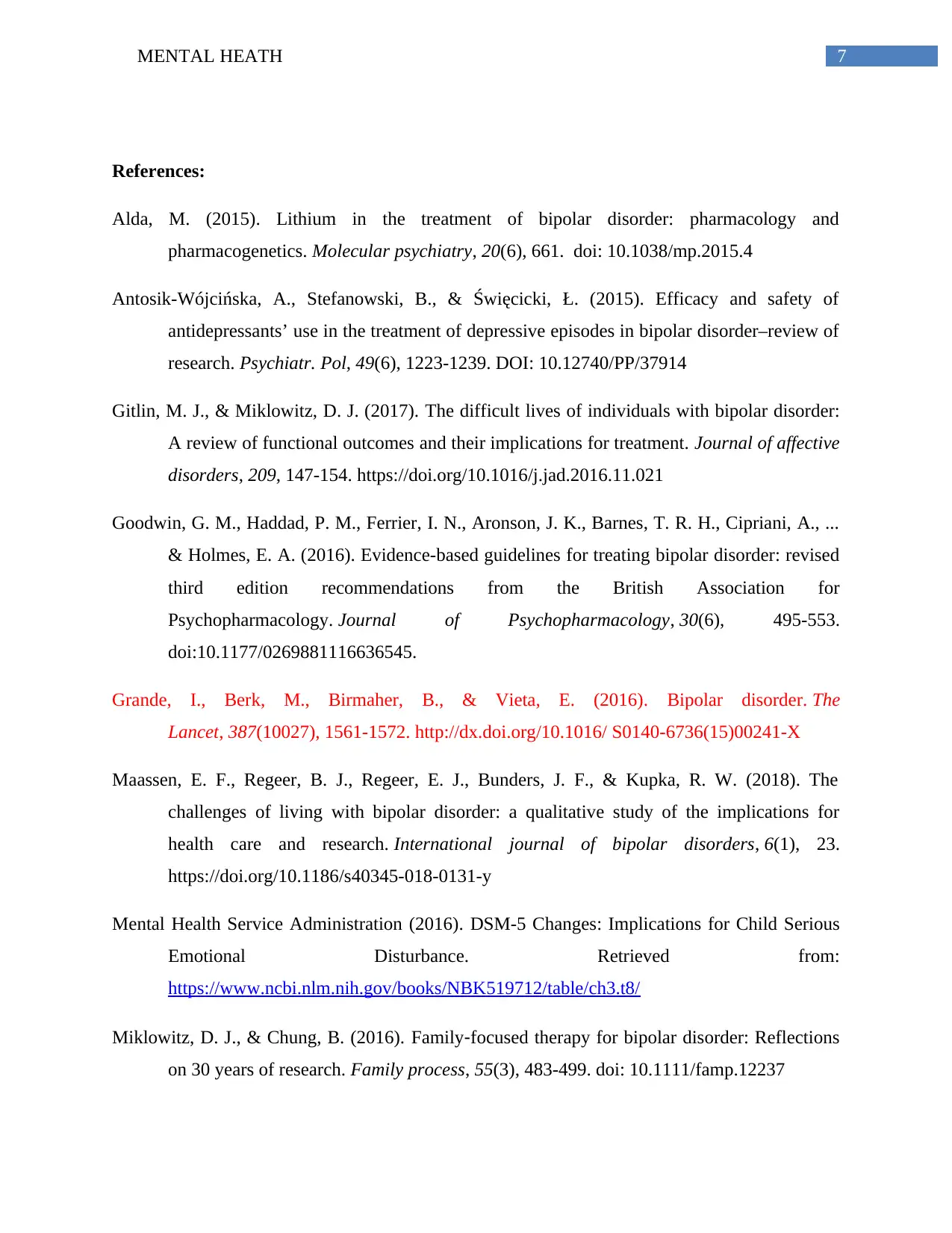
7MENTAL HEATH
References:
Alda, M. (2015). Lithium in the treatment of bipolar disorder: pharmacology and
pharmacogenetics. Molecular psychiatry, 20(6), 661. doi: 10.1038/mp.2015.4
Antosik-Wójcińska, A., Stefanowski, B., & Święcicki, Ł. (2015). Efficacy and safety of
antidepressants’ use in the treatment of depressive episodes in bipolar disorder–review of
research. Psychiatr. Pol, 49(6), 1223-1239. DOI: 10.12740/PP/37914
Gitlin, M. J., & Miklowitz, D. J. (2017). The difficult lives of individuals with bipolar disorder:
A review of functional outcomes and their implications for treatment. Journal of affective
disorders, 209, 147-154. https://doi.org/10.1016/j.jad.2016.11.021
Goodwin, G. M., Haddad, P. M., Ferrier, I. N., Aronson, J. K., Barnes, T. R. H., Cipriani, A., ...
& Holmes, E. A. (2016). Evidence-based guidelines for treating bipolar disorder: revised
third edition recommendations from the British Association for
Psychopharmacology. Journal of Psychopharmacology, 30(6), 495-553.
doi:10.1177/0269881116636545.
Grande, I., Berk, M., Birmaher, B., & Vieta, E. (2016). Bipolar disorder. The
Lancet, 387(10027), 1561-1572. http://dx.doi.org/10.1016/ S0140-6736(15)00241-X
Maassen, E. F., Regeer, B. J., Regeer, E. J., Bunders, J. F., & Kupka, R. W. (2018). The
challenges of living with bipolar disorder: a qualitative study of the implications for
health care and research. International journal of bipolar disorders, 6(1), 23.
https://doi.org/10.1186/s40345-018-0131-y
Mental Health Service Administration (2016). DSM-5 Changes: Implications for Child Serious
Emotional Disturbance. Retrieved from:
https://www.ncbi.nlm.nih.gov/books/NBK519712/table/ch3.t8/
Miklowitz, D. J., & Chung, B. (2016). Family‐focused therapy for bipolar disorder: Reflections
on 30 years of research. Family process, 55(3), 483-499. doi: 10.1111/famp.12237
References:
Alda, M. (2015). Lithium in the treatment of bipolar disorder: pharmacology and
pharmacogenetics. Molecular psychiatry, 20(6), 661. doi: 10.1038/mp.2015.4
Antosik-Wójcińska, A., Stefanowski, B., & Święcicki, Ł. (2015). Efficacy and safety of
antidepressants’ use in the treatment of depressive episodes in bipolar disorder–review of
research. Psychiatr. Pol, 49(6), 1223-1239. DOI: 10.12740/PP/37914
Gitlin, M. J., & Miklowitz, D. J. (2017). The difficult lives of individuals with bipolar disorder:
A review of functional outcomes and their implications for treatment. Journal of affective
disorders, 209, 147-154. https://doi.org/10.1016/j.jad.2016.11.021
Goodwin, G. M., Haddad, P. M., Ferrier, I. N., Aronson, J. K., Barnes, T. R. H., Cipriani, A., ...
& Holmes, E. A. (2016). Evidence-based guidelines for treating bipolar disorder: revised
third edition recommendations from the British Association for
Psychopharmacology. Journal of Psychopharmacology, 30(6), 495-553.
doi:10.1177/0269881116636545.
Grande, I., Berk, M., Birmaher, B., & Vieta, E. (2016). Bipolar disorder. The
Lancet, 387(10027), 1561-1572. http://dx.doi.org/10.1016/ S0140-6736(15)00241-X
Maassen, E. F., Regeer, B. J., Regeer, E. J., Bunders, J. F., & Kupka, R. W. (2018). The
challenges of living with bipolar disorder: a qualitative study of the implications for
health care and research. International journal of bipolar disorders, 6(1), 23.
https://doi.org/10.1186/s40345-018-0131-y
Mental Health Service Administration (2016). DSM-5 Changes: Implications for Child Serious
Emotional Disturbance. Retrieved from:
https://www.ncbi.nlm.nih.gov/books/NBK519712/table/ch3.t8/
Miklowitz, D. J., & Chung, B. (2016). Family‐focused therapy for bipolar disorder: Reflections
on 30 years of research. Family process, 55(3), 483-499. doi: 10.1111/famp.12237
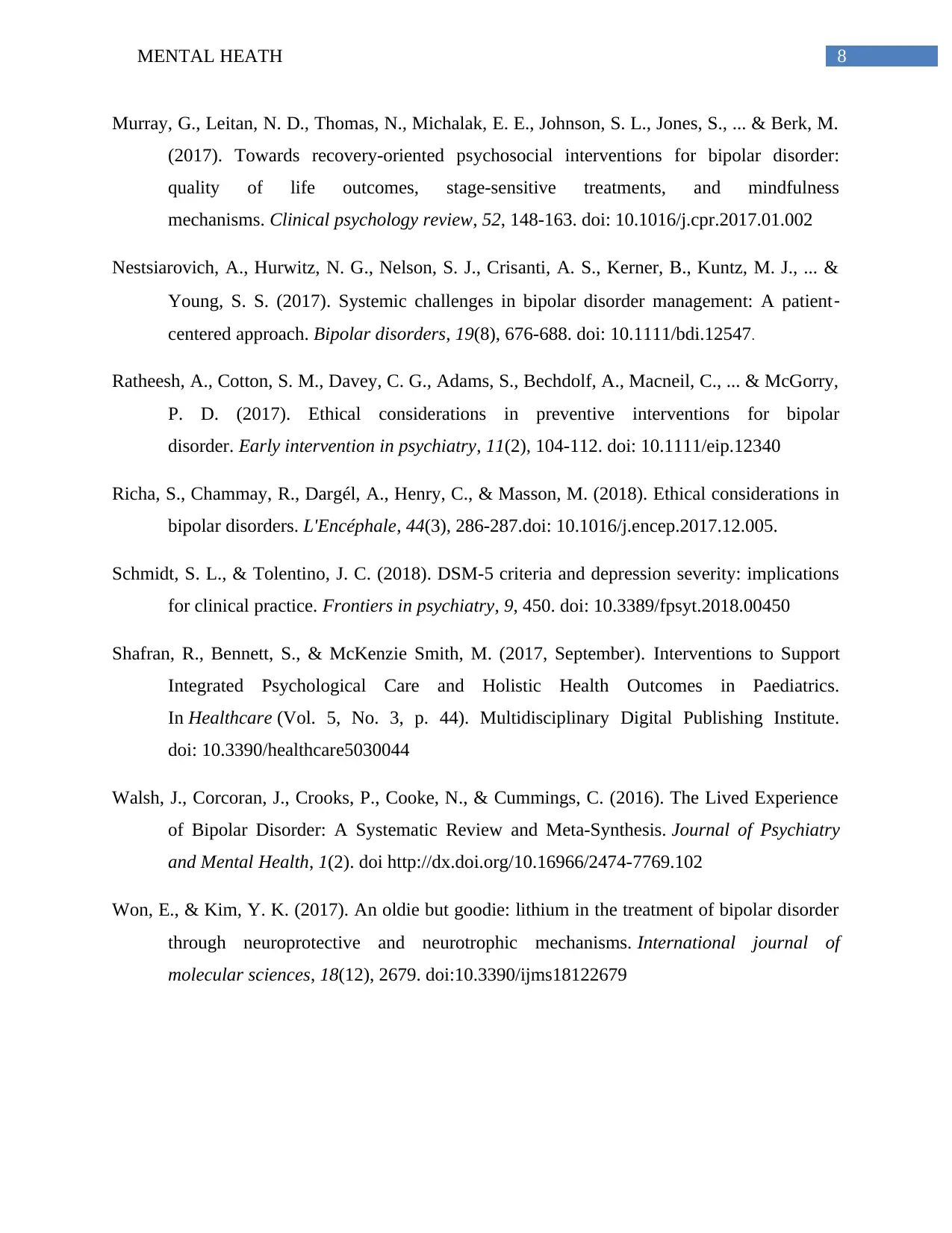
8MENTAL HEATH
Murray, G., Leitan, N. D., Thomas, N., Michalak, E. E., Johnson, S. L., Jones, S., ... & Berk, M.
(2017). Towards recovery-oriented psychosocial interventions for bipolar disorder:
quality of life outcomes, stage-sensitive treatments, and mindfulness
mechanisms. Clinical psychology review, 52, 148-163. doi: 10.1016/j.cpr.2017.01.002
Nestsiarovich, A., Hurwitz, N. G., Nelson, S. J., Crisanti, A. S., Kerner, B., Kuntz, M. J., ... &
Young, S. S. (2017). Systemic challenges in bipolar disorder management: A patient‐
centered approach. Bipolar disorders, 19(8), 676-688. doi: 10.1111/bdi.12547.
Ratheesh, A., Cotton, S. M., Davey, C. G., Adams, S., Bechdolf, A., Macneil, C., ... & McGorry,
P. D. (2017). Ethical considerations in preventive interventions for bipolar
disorder. Early intervention in psychiatry, 11(2), 104-112. doi: 10.1111/eip.12340
Richa, S., Chammay, R., Dargél, A., Henry, C., & Masson, M. (2018). Ethical considerations in
bipolar disorders. L'Encéphale, 44(3), 286-287.doi: 10.1016/j.encep.2017.12.005.
Schmidt, S. L., & Tolentino, J. C. (2018). DSM-5 criteria and depression severity: implications
for clinical practice. Frontiers in psychiatry, 9, 450. doi: 10.3389/fpsyt.2018.00450
Shafran, R., Bennett, S., & McKenzie Smith, M. (2017, September). Interventions to Support
Integrated Psychological Care and Holistic Health Outcomes in Paediatrics.
In Healthcare (Vol. 5, No. 3, p. 44). Multidisciplinary Digital Publishing Institute.
doi: 10.3390/healthcare5030044
Walsh, J., Corcoran, J., Crooks, P., Cooke, N., & Cummings, C. (2016). The Lived Experience
of Bipolar Disorder: A Systematic Review and Meta-Synthesis. Journal of Psychiatry
and Mental Health, 1(2). doi http://dx.doi.org/10.16966/2474-7769.102
Won, E., & Kim, Y. K. (2017). An oldie but goodie: lithium in the treatment of bipolar disorder
through neuroprotective and neurotrophic mechanisms. International journal of
molecular sciences, 18(12), 2679. doi:10.3390/ijms18122679
Murray, G., Leitan, N. D., Thomas, N., Michalak, E. E., Johnson, S. L., Jones, S., ... & Berk, M.
(2017). Towards recovery-oriented psychosocial interventions for bipolar disorder:
quality of life outcomes, stage-sensitive treatments, and mindfulness
mechanisms. Clinical psychology review, 52, 148-163. doi: 10.1016/j.cpr.2017.01.002
Nestsiarovich, A., Hurwitz, N. G., Nelson, S. J., Crisanti, A. S., Kerner, B., Kuntz, M. J., ... &
Young, S. S. (2017). Systemic challenges in bipolar disorder management: A patient‐
centered approach. Bipolar disorders, 19(8), 676-688. doi: 10.1111/bdi.12547.
Ratheesh, A., Cotton, S. M., Davey, C. G., Adams, S., Bechdolf, A., Macneil, C., ... & McGorry,
P. D. (2017). Ethical considerations in preventive interventions for bipolar
disorder. Early intervention in psychiatry, 11(2), 104-112. doi: 10.1111/eip.12340
Richa, S., Chammay, R., Dargél, A., Henry, C., & Masson, M. (2018). Ethical considerations in
bipolar disorders. L'Encéphale, 44(3), 286-287.doi: 10.1016/j.encep.2017.12.005.
Schmidt, S. L., & Tolentino, J. C. (2018). DSM-5 criteria and depression severity: implications
for clinical practice. Frontiers in psychiatry, 9, 450. doi: 10.3389/fpsyt.2018.00450
Shafran, R., Bennett, S., & McKenzie Smith, M. (2017, September). Interventions to Support
Integrated Psychological Care and Holistic Health Outcomes in Paediatrics.
In Healthcare (Vol. 5, No. 3, p. 44). Multidisciplinary Digital Publishing Institute.
doi: 10.3390/healthcare5030044
Walsh, J., Corcoran, J., Crooks, P., Cooke, N., & Cummings, C. (2016). The Lived Experience
of Bipolar Disorder: A Systematic Review and Meta-Synthesis. Journal of Psychiatry
and Mental Health, 1(2). doi http://dx.doi.org/10.16966/2474-7769.102
Won, E., & Kim, Y. K. (2017). An oldie but goodie: lithium in the treatment of bipolar disorder
through neuroprotective and neurotrophic mechanisms. International journal of
molecular sciences, 18(12), 2679. doi:10.3390/ijms18122679
⊘ This is a preview!⊘
Do you want full access?
Subscribe today to unlock all pages.

Trusted by 1+ million students worldwide

9MENTAL HEATH
1 out of 10
Related Documents
Your All-in-One AI-Powered Toolkit for Academic Success.
+13062052269
info@desklib.com
Available 24*7 on WhatsApp / Email
![[object Object]](/_next/static/media/star-bottom.7253800d.svg)
Unlock your academic potential
Copyright © 2020–2026 A2Z Services. All Rights Reserved. Developed and managed by ZUCOL.





